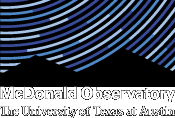April 8 Partial Eclipse at McDonald Observatory
On Monday, April 8, parts of North America will experience a total solar eclipse. This happens when the Moon passes between the Earth and Sun, completely covering the Sun’s disk. The brief moment when the Sun is 100% covered is called “totality.” To see it, you must be within the “path of totality,” a narrow band about 100 miles wide.
The path of totality for April’s eclipse travels from Mazatlán, Mexico, to the island of Newfoundland, Canada. It will sweep into the Lone Star State at Eagle Pass and exit near Texarkana.

